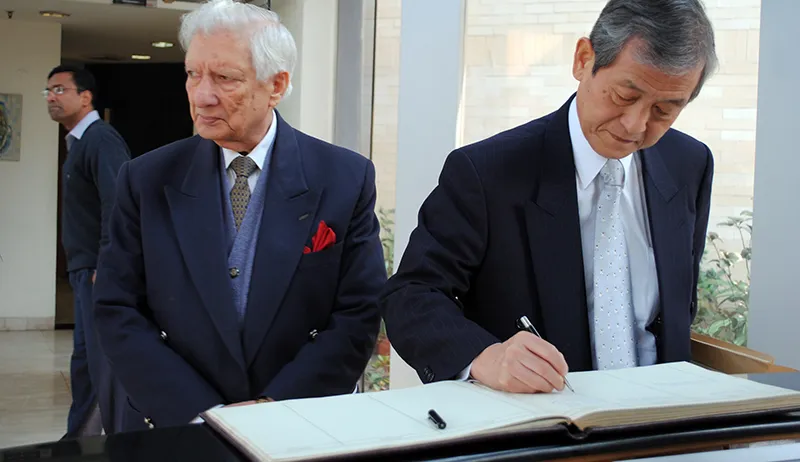-
CENTRES
Progammes & Centres
Location
India and Japan may soon reach an agreement on civil nuclear cooperation, even as Tokyo insists on New Delhi to sign the NPT, says Amb. Hirabayashi Hiroshi, former Japanese ambassador to India and the present President of Japan-India Association.

India and Japan may soon reach an agreement on civil nuclear cooperation, even as Tokyo insists on New Delhi to sign the NPT, says Amb. Hirabayashi Hiroshi, former Japanese ambassador to India and the present President of Japan-India Association. He said this during an interaction with the ORF faculty on 13 January, 2011. He said Japan would continue to insist on India signing the NPT even after it signed the civil nuclear cooperation agreement because of its own internal political compulsions.
Amb. Hirabayashi noted that the liability act would emerge as an issue in the civil nuclear deal because the act includes both operators and producers. He spoke on a wide-range of issues including security developments in East Asia and the current state of India-Japan relations.
Amb. Hirabayashi said Japan is gradually easing its immigration policy on foreign labourers. He said that in the context of the country’s demographic profile today, entry of foreign workers would be desirable. He pointed out that recommendations have been made to the government to open the country especially to high-skilled foreign workers. He, however, noted that even as the country recognizes the need for foreign labourers, it is also concerned about the negative impact of large foreign workers on the country’s identity. He said that Japan is considering the European experiences in dealing with immigration issues. He recognized that Indian workers, particularly in the field of IT and banking, could meet Japan’s needs. Stating that Japan needs foreign workers, Tokyo has to face this question in the near future.
Amb. Hirabayashi said he is aware that the recent Chinese activities in East Asia and the issues of stapled visas to residents of J&K and Arunachal Pradesh and border incursions have alarmed India. He also pointed out that Beijing could be having a "grand strategy" to send its navy to the Pacific Ocean and the Indian Ocean. He said that this can be prevented if regional countries persuade Beijing to act more responsibly. Despite the recent fishing boat incident near Senkaku Islands, Amb. Hirabayashi noted that Japan’s economic relations with China have been good in the recent years, but Tokyo has been concerned about China’s recent aggressive behaviour. He further pointed out that Japan is also frustrated with China in the UNSC concerning matters on North Korea. He, however, clarified that Japan wants to engage with China in regional and international affairs.
He noted that concern about Chinese aggressive posture has been spreading among Southeast Asian nations as a result of the Chinese naval advancement in the South China Sea which has created a sense of wariness on the implications of Chinese investments in the region. Amb. Hirabayashi said that the role of the Chinese military could undergo a change when the new leadership takes over power next year from President Hu Jintao. He pointed out that the new leader is said to be close to the military establishment and hence could restrain the military elements.
Amb. Hirabayashi said relations between Japan and the US are currently moving on the right path to remedy the damage earlier caused by former Prime Minister Hatoyama on the issue of shifting US military bases from Okinawa. He noted that the security alliance between the two countries has been "indispensable" for the stability of the region. He said the foundation of Japan-US relations has been strengthened by the developments in North Korea coupled with the recent Chinese "hegemonic" behaviour in the region.
He said that the internal political situation in Japan remains fragile even though the economy is growing at 2.5 % with the manufacturing sector slowly recovering. He also pointed out that some significant changes are taking place in the defence and security affairs now. A new concept known as "dynamic defence" as against "static defence" has been injected into the national defence policy guidelines in 2009. He pointed out that some important elements of the new concept lie in engaging Japan’s naval force more than it is currently being used and making the movements of naval units more flexible. He also noted that in redefining its security environment, the focus has been shifted from Northern region to South in the context of the future potential security threats. He pointed out that Tokyo no longer perceives any threat from Moscow, but its concern today is on the likelihood of China becoming a threat.
(This report is prepared by Dr K. Yhome, Associate Fellow, Observer Research Foundation)
The views expressed above belong to the author(s). ORF research and analyses now available on Telegram! Click here to access our curated content — blogs, longforms and interviews.